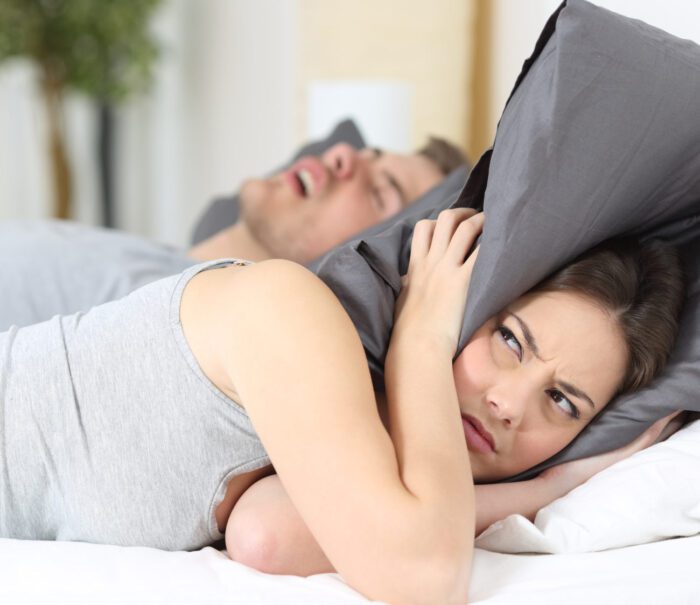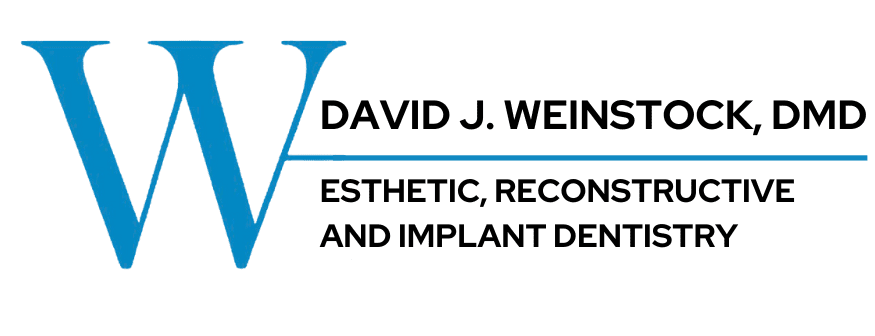Sleep apnea is a chronic medical concern that can cause oral and systemic health problems. The most common type is Obstructive Sleep Apnea (OSA), which occurs when the airway becomes blocked during sleep. When the airway becomes blocked, the patient loses oxygen and cannot breathe. Dr. David Weinstock uses oral appliances to treat sleep apnea in Philadelphia, PA.
Many patients may not realize that a dentist can help treat health problems like sleep apnea. The teeth and jaw can impact the size of the airway. Missing teeth, crooked teeth, TMJ disorders, and more can contribute to sleep apnea. Proper positioning can also help keep your airway open during sleep. After you get professional sleep testing, we may recommend a sleep apnea appliance for mild to moderate symptoms.

The Problem with Sleep Apnea
Patients suffering from sleep apnea often wake up multiple times during the night, gasping for air. These episodes of the airway closing and reopening can happen many times during sleep, sometimes up to 30 times per hour.
Sleep apnea interrupts the body’s oxygen flow to vital organs, including the brain and heart. As a result, you can damage these organs over time. For this reason, sleep apnea treatment is essential to improving your quality of life.
Risk Factors for Developing Sleep Apnea
Many factors may increase your risk of developing sleep apnea. Sleep apnea is often worse in people who drink, smoke, and use sedatives. Patients who are overweight, pregnant, and who use drugs are also more likely to snore and suffer from sleep apnea.
The prevalence of sleep apnea increases with age. As many as 50% of elderly men and women suffer from the disorder. If you have a family history of OSA, a narrow airway, or a small lower jaw, you are also at a higher risk of developing sleep apnea.
These risk factors impact the size of the airway and your breathing patterns. In some patients, being too relaxed with drugs like sedatives reduces breathing during sleep.
Signs and Symptoms
It may be difficult to tell if you have sleep apnea. A condition that occurs while asleep, many patients go undiagnosed for too long. Diagnosing a sleep disorder will typically involve your physician, other specialists, and Dr. Weinstock. Your physician is the only medical professional qualified to diagnose you with sleep apnea.
You will most likely need sleep testing to get an accurate diagnosis. Sleep testing in a lab or at home will track your movements, number of apneas, body position, and other measurements. This testing can determine if you have mild, moderate, or severe sleep apnea.
We can provide X-rays and exams to look for signs of a blockage in your airway. Most importantly, your medical team will review your medical history and discuss your symptoms.
Common signs of sleep apnea that we look for include:
- Chronic fatigue
- Easily distracted, trouble concentrating
- Wake up, gasping for air
- Loud snoring (often pointed out by a sleeping partner)
- Frequent headaches
- Snorting or choking while sleeping
- Feeling depressed
- Unusual irritability
- Waking up to a dry mouth
Please contact our office if you have any of these symptoms and are diagnosed with sleep apnea. We can provide treatment after you receive a sleep apnea diagnosis.
Sleep Apnea Treatment in Philadelphia, PA
Without treatment, sleep apnea can lead to many health complications that can impact the quality of life. Untreated sleep apnea can lead to an increase in heart attacks, stroke, high blood pressure, and heart arrhythmia. Sleep apnea is also associated with type 2 diabetes and depression.
A continuous positive airway pressure (CPAP) machine supplies airflow through a mask, a traditional treatment method for sleep apnea. However, oral sleep devices, which Dr. David Weinstock offers, also help treat sleep apnea.
Oral Sleep Devices
An oral sleep device is similar to a sports mouthguard. We carefully fabricate this appliance to the specifications of your mouth. The device will readjust your bite to keep your tongue from rolling to the back of your mouth during sleep. It keeps your airway open so you can breathe normally during sleep without pauses.
An oral sleep device will help dampen the sound and severity of your snoring. The same loosening of soft tissues often leads to snoring, and an oral sleep device can help prevent snoring.
Patient Review
Sleep Apnea Treatment FAQs
Are you looking to learn more about sleep apnea? Below, we’ve compiled a list of frequently asked questions about sleep apnea to help address your concerns. Continue reading to learn more about sleep apnea in our Philadelphia, PA office with answers to these common questions.
Are there alternatives to CPAP therapy?
Yes, there are other options for treating sleep apnea besides CPAP therapy. Some alternatives include oral appliance therapy and lifestyle changes like losing weight and avoiding alcohol before bed. Dr. Weinstock can assess your condition to help you figure out the best treatment for your specific needs. Trying different methods can help improve sleep quality and reduce sleep apnea symptoms.
Can I use a sports mouthguard at night for sleep apnea?
No. Sports mouthguards are only effective while playing contact sports. These mouthguards are not built like oral appliances for sleep apnea. Although similar, sports mouthguards will not open your airway while you sleep. They are too bulky and will fall out of your mouth. Instead, we recommend a sleep appliance.
How long does it take to cure sleep apnea?
You can find relief from your sleep apnea symptoms in as little as a few days. However, this does not mean that your sleep apnea will be cured. To cure sleep apnea, you must make lifestyle changes such as losing weight, quitting smoking, and eating a healthy diet.
What is the best sleeping position if I have sleep apnea?
Sleeping on your side or your stomach is most likely the best sleeping position for patients with sleep apnea symptoms. These positions ensure your tongue doesn’t block your airway while you sleep, while sleeping on your stomach will create a more narrow airway.
Can sleep apnea cause esophageal problems?
Yes, sleep apnea can contribute to esophageal issues, particularly gastroesophageal reflux disease (GERD). When you experience obstructive sleep apnea, the repeated pauses in breathing can create pressure changes in the chest and abdomen. This pressure can cause stomach acid to reflux into the esophagus, leading to heartburn and acid reflux. Over time, chronic acid exposure can damage the esophagus, causing inflammation. Managing sleep apnea can help reduce these risks.
Can sleep apnea cause sinus issues?
Sleep apnea doesn’t directly cause sinus issues. However, the two conditions are often interrelated. Sinus problems can worsen sleep apnea symptoms by making breathing more difficult. Additionally, sleep apnea can exacerbate sinus inflammation. Both conditions share risk factors and often coexist. Studies show a high prevalence of sinus issues in sleep apnea patients. Treating sinus problems may help improve sleep apnea symptoms and treatment effectiveness.
Can sleep apnea cause bruxism?
Sleep apnea and bruxism (teeth grinding) have a strong connection. Many patients who suffer from sleep apnea also experience bruxism. While sleep apnea doesn’t directly cause bruxism in all cases, the two conditions often occur together and may influence each other. Treating sleep apnea can usually help reduce or eliminate bruxism. This will also help improve sleep quality and oral health.
Schedule an Appointment to Learn More About Sleep Apnea Treatment in Philadelphia, PA
Did you complete a sleep study? Have you been diagnosed with sleep apnea by a sleep specialist? If so, contact our Bala Cynwyd, PA, dentist’s office to learn more about dental appliances. You may be a candidate for a portable, convenient sleep appliance.
Treat sleep apnea symptoms and avoid the harmful long-term effects of sleep apnea today by calling (215) 857-8054. You can also request an appointment online by filling out the form. If you have any questions about sleep apnea treatment, let us know at your next visit.
